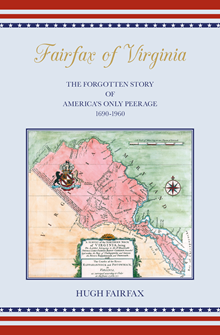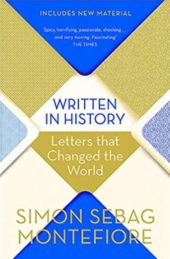Hugh, the Fairfax name is most well-known because of the 3rd Lord, Sir Thomas (1612 – 1671), but what are the origins of the family?
The Fairfax family is first heard of in the 12th Century with Henry owning land at Askham near York. Like many people in the north of England they were of Viking origin. During the Middle ages they were landowners, soldiers and one, Edward, a famous poet. Through a series of fortuitous marriages they acquired several estates, Gilling, Denton, Nun Appleton, Steeton and Bibrough. The family spit into different branches, the senior being the Catholic Fairfax’s of Gilling who expired in the 1700’s. Sir Thomas Fairfax was of the Denton branch. His grandfather was raised to the Peerage in 1627 as Baron Fairfax of Cameron.
Why did the 6th Lord Fairfax (1693 –1781) choose to leave England for the Colonies?
When 6th Lord Fairfax succeeded to the barony in 1710 he found his family’s fortunes in a poor state which resulted in the sale of the Yorkshire estates. However he inherited both Leeds Castle in Kent and the Northern Neck Proprietary from his mother Catherine Culpeper. The vast Northern Neck Proprietary of over 5 million acres was originally created in 1649 by the exiled King Charles II as a refuge for his loyal Royalist supporters, among them Catherine’s grandfather, following the execution of his father King Charles I. The Proprietary had been badly managed by the Culpeper’s agent Robert ‘King’ Carter and on his death in 1732 Lord Fairfax took matters into his own hands, appointing his cousin Colonel William Fairfax as his agent and visiting the colony in 1735. There followed a long running dispute between the Lord Fairfax and the Virginia Assembly as to the extent and boundaries of the Proprietary. When this was finally settled in his favour, Lord Fairfax moved there permanently in 1749.
The 8th Fairfax was a good friend of George Washington. How did this friendship survive the tumult of the American Revolutionary War?
Bryan, 8th Lord Fairfax was indeed a very good friend of George Washington. Very different in character, Bryan was an indecisive and introspective man, constantly changing course in life and never happy with his lot. He frequently moved house and was briefly Rector of Christ Church Alexandria before resigning. But in his friendship with George Washington he was constant and they remained friends throughout their lives, writing to one another regularly. Most of these letters concerned such matters as the management of their estates but on one occasion Bryan wrote to George trying to dissuade him from breaking with the Crown. George’s reply was firmly in the negative. When hostilities broke out Bryan attempted to travel to London to act a go between but was arrested twice, once by the British and once by the Colonialists. He visited George at Valley Forge on his way home. Taking no further part in the conflict, he was left undisturbed and at the War’s end his property was left intact. This was almost certainly because of his close friendship with George.
Were it not for the Revolution and the Virginia Act of 1779, the Fairfax family would be in possession of a significant chunk of Virginia. Are there any hard feelings more than 200 years later?
The Fairfax family were largely exempted from the Virginia Act. This was due to their close friendship with George Washington and the help given by George William Fairfax to American prisoners in England. Any land that Lord Fairfax had not granted to himself or others by deed was confiscated by the Commonwealth of Virginia. This still left the Fairfax’s with considerable swathes of property. The heir to this was his nephew Denny Martin. He eventually sold his inheritance to a syndicate led by John Marshall for a total of £34,000. The 6th Lord Fairfax’s brother Robert, 7th Lord, was awarded the sum of £13,758 in 1792 by Parliament under the terms of the Act for the Relief of American Loyalists. These were very considerable sums at the time, so it is hard to feel sorry for the family, although as my wife often says, one acre of Fairfax County would be nice, given that today it is second richest county in the whole of the USA.
Slavery is often a subject that comes up in this period of American history, and later. The 9th Lord Fairfax (1762–1846) comes out of this period well doesn’t he?
Thomas 9th Lord Fairfax and his brother Ferdinand were followers of Emmanuel Swedenborg, who preached that all men are born equal in the eyes of God. During their lives Thomas and Ferdinand both set many of their slaves free by the act of manumission. In particular, Thomas freed one called Simon who took the name Fairfax and his descendant Justin was recently Vice Governor of Virginia.
The book is a fascinating trip through the history of the United States, the Gold Rush being one such. Was this profitable for Charles Fairfax, the 10th Lord (1829 – 1869)?
Sadly not. Charles never discovered any gold and instead became a politician. He was immensely generous and lived the life of a Southern gentleman, dispensing lavish hospitality to all who came to his home Birds Nest Glen in Marin County. An infamous duel was fought there in 1861. Wounded in a brawl he died young aged only forty, but is still remembered today with great affection. The City of Fairfax was later named in his memory.
How was the family affected by the American Civil War?
As loyal Virginians most of the Fairfax family rallied to the Confederate cause but at a great cost. Their home Vaucluse, high on a hill overlooking Alexandria was razed to the ground by a vengeful Union Army and the family scattered. Two were killed in battle and others wounded. Truly it was Gone with the Wind.
The Fairfax left America much later to return to Blighty. Why was that?
As the War drew to a close in 1865, my great Grandfather Dr John Contee Fairfax (11th Lord) moved to Maryland and settled on a tobacco farm near Largo called Northampton. This would remain in the family until 1960. Born in 1870, my grandfather, Albert, always known as Beech, (12th Lord) had only three years of schooling before he was sent to New York to work as a bank clerk with Brown Brothers. Determined to rebuild the family’s fame and fortune, he was a diligent and hard-working young man. Then in 1900 when his father died, everything changed: Suddenly he was discovered by the press as the lost Lord, rather like Little Lord Fauntleroy, and was duly summoned to the Coronation of Edward VII in London. Suddenly famous, his career took off and with it came the beginnings of his fortune. Feeling it his duty to reclaim the long-ignored title, in 1908 he renounced his American citizenship and became an Englishman. In 1923 he married and in 1925 he founded his own bank in the City of London, Fairfax and Co. My father and Uncle were born shortly afterwards. The wheel had come full circle.
Hugh Fairfax is the author of Fairfax Of Virginia: The Forgotten Story Of America’s Only Peerage, 1690 -1960, published by Chiselbury.







